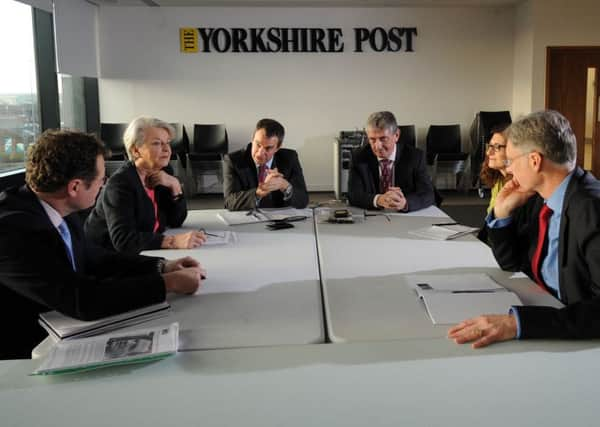Health chiefs reveal £200m plan for medical quarter in Leeds


Linda Pollard, chair of the Leeds Teaching Hospitals NHS Trust, said the £200m masterplan would create a new hospital development on the site of the Leeds General Infirmary with “massive civic value”.
It would include new children’s and outpatients’ services, research facilities, demolition of old 1970s buildings and the redevelopment of the grade I-listed facade as well as a road improvement scheme and commercial property opportunities for the public and private sectors.
Advertisement
Hide AdAdvertisement
Hide Ad“That can really put Leeds on the map,” said Ms Pollard. “It is one of the most exciting things that could happen to Leeds in a long time outside the train station...
“For our patients we cannot afford to wait much longer because we are bursting.”
She made the comments at a round table hosted by The Yorkshire Post and law firm Bevan Brittan on the fall-out from last week’s Comprehensive Spending Review, which included £22bn in efficiency savings in the NHS.
Tony Whitfield, finance director at the £1.2bn-turnover trust, said the medical quarter scheme could generate receipts of £30m-£40m.
Advertisement
Hide AdAdvertisement
Hide AdHe added: “It is not very often somebody can come up with a site in the middle of a city that is ripe for all sorts of opportunities that will have little to do with healthcare in order to allow healthcare in the city to be as modern as it needs to be.
“Leeds Teaching Hospitals has had no major capital investment for over ten years and it shows. When you look at other cities around the country and see the kind of investments that has gone in there...”
The trust operates wings bigger than hospitals in other parts of the country and is the largest provider of specialist services in the NHS.
Ms Pollard said: “In any business you have to invest. Nothing stands still. What we haven’t got is that capital to be able to move forward and invest in the future. We are desperate for capital investment in Leeds.”
Advertisement
Hide AdAdvertisement
Hide AdMichael Boyd, head of Bevan Brittan’s new Leeds office and a commercial health partner, explained how the medical quarter scheme could be funded.
He said: “There are ways of doing it. I would suggest a mix of public capital, lobbying local MPs and the Government about the opportunity that is created for the city but also the broader NHS, attracting private sector, third sector, university and local authorities locally into making contribution towards the scheme and then the final piece of the jigsaw is private sector funding, which is of course needs to be affordable.”
Ms Pollard said the scheme could attract inward investment in Leeds. She added: “They see success and success breeds success. We want an international reputation and then people will want to come and work in Leeds for a whole raft of reasons. The money will follow because people will want to be part of success.”
The debate covered some of the big and complex challenges facing the NHS, including the nursing gap, which is causing trusts to spend more in agency staff, and the shortage of available beds due to a lack of facilities to move people into after acute care.
Advertisement
Hide AdAdvertisement
Hide AdOn the capacity issue, Ms Pollard said: “There was not a bed in England to be had on Friday night.”
Mr Whitfield added: “The biggest financial challenge is the supply chain. We need to get people into the hospital and out of the hospital very quickly. At the moment, we have a significant number of people who could be in a different place if we had a more radical care model than we have. About a third of people in a hospital bed could be in an alternative setting.”
These patients often have multiple issues and need facilities that are more than convalescent such as packages for care at home or a nursing home, said Ms Pollard.
Mr Whitfield said: “This is where the private sector has a huge opportunity, to come into the supply chain.”
Advertisement
Hide AdAdvertisement
Hide AdHowever, it is not so straightforward, warned Jonathan Oxley, chairman of the Institute of Directors in Yorkshire and the Humber.
He said: “At the moment, the financial issues are fracturing the provision. You see local authorities tendering for domicillary care and no-one applying because they don’t fancy the rates much.
“To some extent it is the same with residential care. You keep coming back to the cost and the funding.
“Inevitably businesses will innovate but equally they will want to charge a profit.”
Devo coup across the Pennines
Advertisement
Hide AdAdvertisement
Hide AdGreater Manchester scored a coup when it persuaded the Chancellor George Osborne to devolve long-term health and social care spending worth £6bn to the region.
But there is no local authority appetite for a similar bid in Leeds, according to Linda Pollard, chair of the Leeds Teaching Hospitals NHS Trust.
The joint approach is seen as key to helping the NHS tackle an ageing population with long-term health problems.
Judith Barnes, local government partner at Bevan Brittan, said: “Local authorities need to put aside some of their principles and differences and work together more collectively to try and deliver a better place for the residents of West Yorkshire and beyond.
“There are huge challenges around leadership and budgets are only getting smaller.”